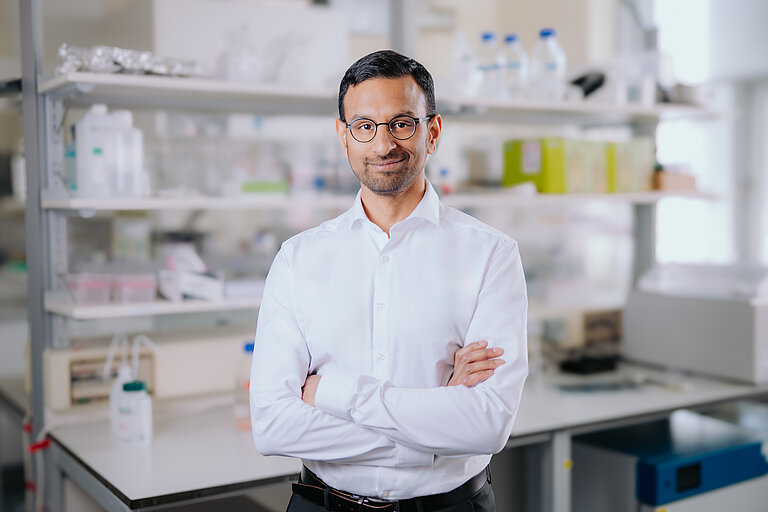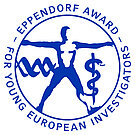- Eppendorf Corporate
- Company
- Scientific Awards
- European Award
Application deadline has expired
Winner 2025 Eppendorf Award for Young European Investigators
Congratulations to Dr. Varun Venkataramani on winning the 2025 Eppendorf Award for Young European Investigators for his research on the discovery and characterization of synaptic neuron-tumor networks driving brain tumor progression. His research on how synaptic neuron tumor networks can drive brain tumor progression was recognized by the jury panel as truly ground-breaking. The jury acknowledged the importance of the emerging field of neuro-oncology and Dr. Venkataramani‘s role in unravelling how neurons and tumors interact and the translational potential of his work.
Read more about Varun Venkataramani‘s work here.
Watch the recording of the Award Ceremony here.

About the Award
Since 1995 the Eppendorf Young Investigator Award is granted annually to one early career scientist in Europe not older than 35 years at the time of entry. It acknowledges outstanding contributions to biomedical research in Europe based on methods of molecular biology, including novel analytical concepts. The winner is selected by an independent expert committee chaired by Prof. Laura Machesky (Department of Biochemistry, University of Cambridge, UK).
This prize, which reflects the past and future of Eppendorf in a manner befitting the wishes of the company's founders, Dr. Heinrich Netheler and Dr. Hans Hinz, is intended to symbolize the close links between the company and the field of biomedicine.
The award was first established in 1995 on occasion of Eppendorf’s 50th anniversary.
The Eppendorf Award for Young European Investigators is presented in partnership with the scientific journal Nature.
Prize money € 20,000
The Award winner will receive
- a prize money of 20,000 Euro (unrestricted personal cash award)
- comprehensive coverage of his/her work by Nature in print and online
- a custom podcast produced and published by Nature
- an invitation to the prize ceremony at the EMBL Advanced Training Centre in Heidelberg, Germany, including complimentary transportation and hotel accommodation
- an invitation to visit Eppendorf SE in Hamburg, Germany, including complimentary transportation and hotel accommodation
- free Eppendorf products of choice worth € 1,000
- 1-year free Nature subscription (print and online)
Finalists
Besides the grand prize winner the jury may appoint up to two finalists each year.
The finalists will receive
- A brief introduction of the finalists in the Award Feature in Nature in print and online
- an invitation to the prize ceremony at the EMBL Advanced Training Centre in Heidelberg, Germany, including complimentary transportation and hotel accommodation
- free Eppendorf products of choice worth € 1,000
- 1-year free Nature subscription (print and online)
Contact information
For questions regarding the Award, please send an email to: award@eppendorf.de
Nature journal
The Eppendorf Award for Young European Investigators is presented in partnership with the scientific journal Nature.
Click here to visit
Entry details & judging procedures
Who can apply for the award?
Entrants must be early career scientists with an advanced degree (Ph.D. or M.D.) performing biomedical research in Europe based on methods of molecular biology, including novel analytical concepts, who are not older than 35 years of age* at the time of entry.
*The eligibility threshold can be extended for the following documented circumstances:
- Maternity leave: 18 months extension for each child born. If the applicant can document a longer total maternity leave, the eligibility period will be extended by the documented time of actual leave(s) for all children taken
- Paternity leave: extension by the documented time of paternity leave for each child born
- Disability, long-term illness (absence from academic activity of more than six consecutive months in a year)
- National or civilian service: extension by the documented amount of leave taken by the applicant
- Clinical training: extension by the documented time of clinical training received by the applicant up to a maximum of 2 years
How to apply
Online applications for the Eppendorf Award for Young European Investigators are accepted from October 1 of each year onwards at www.eppendorf.com/award/application
Application deadline: January 15 of each year.
Nominations are not accepted.
Your application must include:
- your personal data
- your curriculum vitae
- a title describing the subject of your research
- an essay of max. 2,000 characters (incl. spaces) summarizing your research
- a brief description of your major discovery
- your publication list with PDF files of your published papers (min. 3 - max. 5)
Your application and all submitted documents must be in English.
Judging procedures
Eppendorf has no influence on deciding who receives the award.
The prize is awarded by an independent committee composed of six renowned experts under the chairmanship of Laura Machesky (Department of Biochemistry, University of Cambridge, UK), from the fields of:
- Cell Biology and Cancer (Laura Machesky: Department of Biochemistry, University of Cambridge, UK)
- Genetics and Physiology (Sadaf Farooqi: Wellcome-MRC Institute of Metabolic Science, University of Cambridge, UK)
- Developmental Biology (Madeline Lancaster: MRC Laboratory of Meluclar Biology, University of Cambridge, UK)
- Genomics and Systems Biology (Ben Lehner: Center for Genomic Regulation, Barcelona, Spain and Wellcome Sanger Institute, Cambridge, UK)
- Structural Biochemistry (Stefan Raunser, Max Planck Institute for Molecular Physiology, Dortmund, Germany)
- Immunity and Cell Migration (Michael Sixt, Institute of Science and Technology Austria, Klosterneuburg, Austria)
The papers submitted will be evaluated with respect to the following five selection criteria:
1. Independent scientific work
2. Creativity (independent of instructions from head of institute)
3. Successful practical application of research approach
4. Significance of research results for the field of medicine
5. Achievement of candidate in relation to his/her age
The main focus is on investigating the molecular biological mechanisms of the human organism and then translating this research into practical findings. The long-term goal is the diagnosis and therapy of those diseases which have yet to be treated successfully.
The final selection of the winner takes place at a Jury-Meeting at the end of February each year. Winner and finalists will be informed immediately afterwards.
2025 Award Winner & Finalists
2025 Award Winner: Varun Venkataramani
Award Winner
Varun Venkataramani
Universitätsklinikum Heidelberg, Germany
Finalists
Dr. Fena Ochs
University of Copenhagen, Biotech Research & Innovation Centre (BRIC), Denmark
Dr. Juliette Fedry
MRC Laboratory of Molecular Biology, Cambridge, United Kingdom
Past Award Winners
2024 Award Winner
Dr. Clemens Plaschka
IMP – Institute of Molecular Pathology, Vienna, Austria
2023 Award Winner
Dr. Maurice Michel
Science for Life Laboratory, Karolinska Instituted, Stockholm, Sweden
2022 Award Winner
Dr. Thi Hoang Duong Nguyen
Group Leader at the MRC Laboratory of Molecular Biology, Cambridge, UK
2021 Award Winner
Dr. Tanmay Bharat
Group Leader at Sir William Dunn School of Pathology, Oxford University, United Kingdom
2020 Award Winner
Prof. Randall Platt
Assistant Professor of Biological Engineering, Department of Biosystems Science and Engineering, ETH Zurich, Switzerland
2019 Award Winner
Dr. Georg Winter
Principal Investigator at the CeMM Research Center for Molecular Medicine of the Austrian Academy of Sciences, Vienna, Austria
2018 Award Winner
Prof. Andrea Ablasser
Assistant Professor at the Swiss Federal Institute of Technology, Lausanne, Switzerland
2017 Award Winner
Tom Baden, PD PhD
Senior Lecturer in Neuroscience at the School of Lice Sciences, University of Sussex, Brighton, United Kingdom
2016 Award Winner
Prof. Adrian Liston
Group leader at VIB Translational Immunology Lab, University of Leuven, Belgium
2015 Award Winner
Dr. Thomas Wollert
Research Group Leader at the Max Planck Institute of Biochemistry in Martinsried, Germany
2014 Award Winner
Madeline Lancaster
Marie Curie Postdoctoral Research Fellow, Laboratory of Juergen Knoblich, Institute of Molecular Biotechnology of the Austrian Academy of Sciences (IMBA), Vienna, Austria
2013 Award Winner
Benjamin Lehner
EMBL-CRG Systems Biology Unit Centre for Genomic Regulation Barcelona, Spain
2012 Award Winner
Dr. Elizabeth Murchison
Wellcome Trust Sanger Institute, Cambridge, United Kingdom
2011 Award Winner
Assistant Professor Suzan Rooijakkers, PhD
University Medical Center Utrecht, Department of Medical Microbiology, Utrecht, The Netherlands
2009 Award Winner
Dr. Óscar Fernández-Capetillo
Head, Genomic Instability Group, Spanish National Cancer Center (CNIO), Madrid, Spain.
2008 Award Winner
Dr. Simon Boulton
Cancer Research UK, London Research Institute, UK
2007 Award Winner
Dr. Mónica Bettencourt-Dias
Instituto Gulbenkian de Ciência, Oeiras, Portugal
2006 Award Winner
Dr. Luca Scorrano
Dulbecco-Telethon Institute, Venetian Institute of Molecular Medicine, Padova, Italy
2005 Award Winner
Dr. Thomas Helleday
Arrhenius Laboratory Department of Genetics, Microbiology and Toxicology, Stockholm University
2004 Award Winner
Prof. Dr. Patrick Cramer
Gene Center, University of Munich, Germany
2003 Award Winner
Prof. Dr. Silvia Arber
Biozentrum, University of Basel, Friedrich-Miescher-Institute Basel, Switzerland
2002 Award Winner
Dr. Thomas Tuschl
Göttingen, Germany
2001 Award Winner
Dr. Andreas Mayer
Friedrich-Miescher Laboratory of the Max-Planck-Gesellschaft, Tübingen, Germany
2000 Award Winner
Dr. Dario Alessi
MRC Protein Phosphorylation Unit, University of Dundee, Scotland
1999 Award Winner
Dr. Jean Pieters
Basel Institute for Immunology, Switzerland
1998 Award Winner
Professor Dr. Michael Wegner
Center of Molecular Neurobiology, University Hospital (UKE), Hamburg, Germany
1997 Award Winner
Professor Dr. Helena Edlund
Department of Microbiology, University of Umea, Sweden
1996 Award Winner
Professor Dr. Ueli Suter
Institute of Cell Biology, Swiss Federal Institute of Technology, ETH Zürich
1995 Award Winner
Professor Dr. Stephen P. Jackson
Wellcome/CRC Institute, University of Cambridge, England
Press releases & speeches
2025
Speech: Laudation for Dr. Varun Venkataramani
2024
Speech: Laudation for Dr. Clemens Plaschka
2023
Press Release Eppendorf Award for Young European Investigators 2023 goes to Maurice Michel, Sweden
Speech: Laudation for Dr. Maurice Michel
2022
Speech: Laudation for Dr. Thi Hoang Duong Nguyen
2021
Speech: Laudation for Tanmay Bharat
2020
Speech: Laudation for Randall Platt
2019
Speech: 27.6.2019 – Laudation for Georg Winter by Prof. Reinhard Jahn
2018
Speech: 21.6.2018 – Laudation for Andrea Ablasser by Prof. Reinhard Jahn
2017
Press release: 23.6.2017 - 2017 Eppendorf Award for Young European Investigators presented to Tom Baden
Speech: 22.6.2017 – Laudation for Tom Baden by Prof. Maria Leptin
2016
Press release: 2.6.2016 - Presentation of Eppendorf Young Investigator Award 2016 in Heidelberg
Speech: 2.6.2016 – Laudatio for Adrian Liston by Prof. Reinhard Jahn
2015
Press release: 25.6.2015 - Presentation of Eppendorf Young Investigator Award 2015 in Heidelberg
Speech: 25.6.2015 – Laudatio for Thomas Wollert by Prof. Reinhard Jahn
2014
Press release: 22.05.2014 - Presentation of Eppendorf Young Investigator Award 2014 in Heidelberg
Speech: 22.05.2014 - Laudatio for Madeline Lancaster by Prof. Dr. Reinhard Jahn
2013
Press release: 06.06.2013 – Presentation of Eppendorf Young Investigator Award 2013 in Heidelberg
Speech: 06.06.2012 – Laudatio for Ben Lehner by Prof. Dr. Reinhard Jahn

